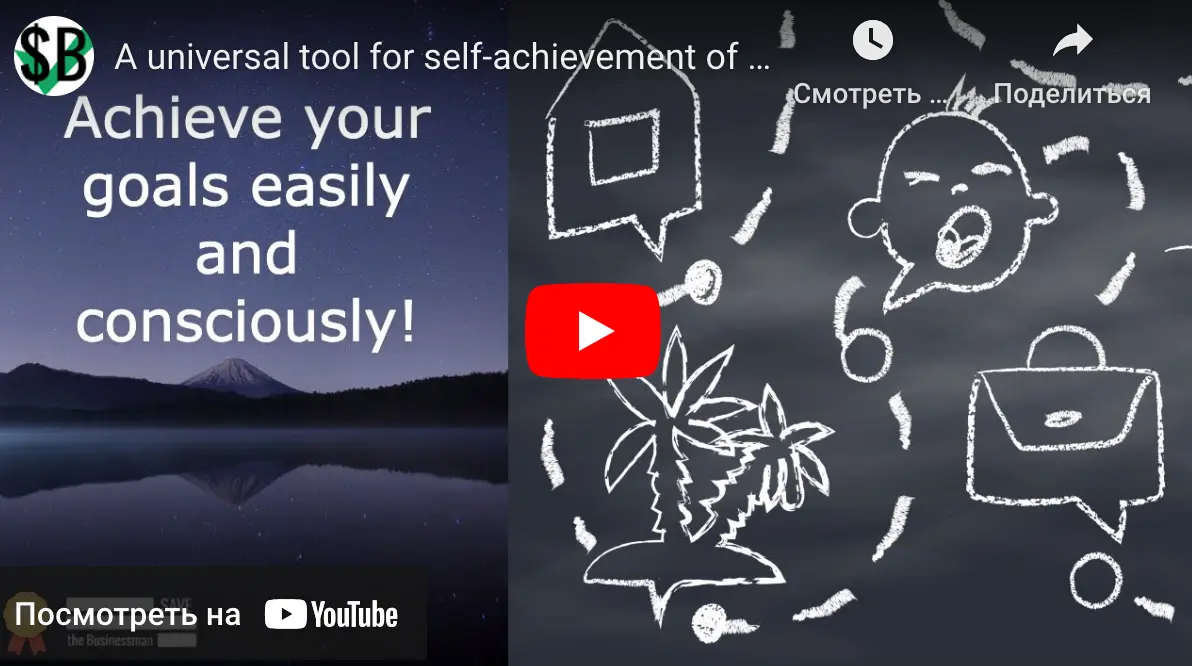Global problems of humanity are united by common factors. We have identified seven of the most noticeable circumstances that prevent us from finding solutions to global threats often called "Global Problems of Humanity". These are new markets and unlimited - and most importantly, so much needed by all of us - demand!
One more list of classic problems is not included into the concept of "Save The Businessman In Yourself", we cite them only in order to warn you about what an ambitious entrepreneur, a wise leader who builds his business by filling human-created demand will have to face - a solution to Global problems. Focus not on problems, but on pitfalls that may be on the way to solving them. It is not by chance that we raise this topic, it’s because we believe that the implementation of ideas for solving these problems themselves is the key to a successful, durable and profitable business with a generally useful foundation for an established enterprise or organization. Such a business does not contradict the laws of Nature, which means it has unlimited potential. Remember only the ideas of Elon Musk, of this brave Entrepreneur and creator: the energy of the Sun, eco-cars and others.
Traditional lists of global problems of mankind include demographic problem, overcoming the backwardness of the third world, raw materials, ecology, energy. Experts have been formalizing global problems and looking for a way out of them since the Second World War, and the War itself has become a major catastrophe-example and another yet unresolved "problem of peaceful coexistence."
A person is able to make a decision instantly. The consequences of the adopted managerial decisions are retained in the life of mankind much longer, both positive and destructive. The world community is experiencing problems in connection with its own activities, or due to the chosen way of reading reality.
“Problems” are a link in a chain: “a person, a solution, a tool, a society” - problems loop the chain and become another reproach-challenge for the “managing man”. The TOP 7 ranking is conditional. The items on the list are, to varying degrees, involved in certain global problems of humanity.
1. Disability under the dictatorship of experts.
In 1968, the Italian industrialist Aurelio Peccei gathered a hundred of the world's best specialists in the cultural, scientific, political, financial fields and founded the Club of Rome. The organization has chosen solving global problems of mankind as a goal. Within 50 years, the Club, as well as thousands of experts in social and economic fields, whose work is assisted by the structure, have not yet reached the goal.
This is not to say that the intellectual search within the Club is meaningless, and the problem really has a final solution. However, it is impossible not to note that the Club and other international organizations are looking for ways to improve the life of civilization by methods of scientific knowledge and manual management of the development of events. Experts believe that the default planned world of the future will be better than the random one, which will develop without their contribution.
Experts explore and design the future, ranging from waste management and industry quotas across countries and regions, to morality and family structure. A person, his habits, place of residence, type of state, relations with the world community – all these must be re-investigated, designed and implemented in practice.
Ironically, the countries of the "golden billion", whose representatives are members of the Club, have never had a foreign letter with a Plan for building happiness in their hands, authored by one of the world's centers for developing well-being. Monarchs and politicians of the past, of course, were experts, they planned development, their states interacted or fought, but the countries of the "golden billion" achieved peace, social and economic well-being on their own.
All of the above means two things at the same time. Firstly, the owners of scientific knowledge manage and will continue managing the solution of global problems. Secondly, the educated elites will sweep aside the retrogrades and bearers of competing views on the attainability of "unscientific" improvement in human life.
Sounds scary! But it is the Conscious acceptance of reality that begets the resistance that will help the Enterprising person become stronger and offer such a solution that will blow up the whole world! It will amaze you with its simplicity and environmental friendliness, will find a response in the hearts of billions and unite everyone. After all, no one yet knows the correct answers and it is quite possible that 95-99% of fish is swimming in the wrong direction! It may be you that act and think correctly!
2. Live evolution and improvement "outside the law".
KPIs have become the norm of the XX-XXI centuries. Artificial metrics logically complemented the “standardization” required in the new era. It seems that the "metrics" did not promise problems. On the contrary, the aggregate numbers allowed ordinary managers and government officials to adequately and, most importantly, timely feel the changes in the accelerating reality. The trouble is that "indicators" do not tolerate non-standard improvements and nullify values outside the "indicator" presets.
Metrics, in addition to the measurements themselves, structure life in a specific way. Excellence outside the metric is outlawed. The path to it is a pointless waste of time and resources, from the point of view of administering the world through KPIs.
A good example is the Unified State Exam, an exam test. Expectations: a universal metric, a score for the number of correctly marked results is a fair height for adolescent entry into adulthood. Reality: the artificial invention of the Ministry of Education official structures not the final result, but the daily life of the teacher and students. The time at the school desk is devoted to "training for tests", but not to the formation of analytical skills and broadening horizons. They do not fall under the KPI - they are no longer "needed".
Here's another huge niche - raising our children, our future! Which will express themselves, explore the world and create boldly, may not be skillful in places. As we remember from history, not a single civilization has achieved success by forcibly implanting something.
3. Conditions, necessary for total failure.
The solution of global problems lasts half a century, but the third world is still hopelessly hungry, aggressive, its gap from the countries of the golden billion is growing. Disasters in undeveloped parts of the world are accompanied by concomitant circumstances, four factors are vivid.
Solving global problems is a huge labor market for officials. Problems give jobs to bureaucrats in dozens of specialized agencies of UN, The World Bank and the IMF, Greenpeace, Red Cross, UNICEF, OECD. Somewhat in the shadows, dozens of smaller organizations - where officials are working out international programs to eliminate hunger, to develop agriculture and to establish production standards. Government officials “need” problems to build their careers.
Belief in scientific and technological progress seems absolute. Experts, with the spontaneity characteristic of the West, suggest that the victory of man over the nature of the Earth (and man) is inevitable, just not yet achieved.
The poorest countries tend to be ruled by authoritarian or totalitarian governments. Developing countries are characterized by revolutions, coups and successive dictatorships.
The fourth circumstance arises from the third one – developing countries are characterized by an exhausted civil society. Unable to resist, both domestic and international coercion.
Another niche is Education of adults in the spirit of moderate egoism and philanthropy. This is not a religion, we have nothing to do with it. We are talking about culture, mass information, values, respect. And all this is for our present - active population, adults. We are what we eat, this is also true for information products. Let's start with ourselves!
4. The information revolution has not made the world any wiser.
The speed of spreading stupidity is equal to the speed of spreading wisdom, at least. More often it exceeds it. The rule of thumb is also true for the speed at which lies spread. The Internet itself, like other former electronic media, is not obliged to play along with the authors of fake news or false propaganda, but it contributes to increasing their volume.
Michael P. Lynch, in his book "The Internet of Us: Knowing More and Understanding Less in the Age of Big Data", warns that "evidence" in its classical sense is losing its meaning in the XXI century and compares Internet search with religious practice - faith. In the past, assessing a situation required a factual analysis. Now: "We google knowledge, we no longer take responsibility for our own beliefs." In the XXI century, confidence has disappeared as to where people's knowledge comes from: from facts or from faith?
Historian of Harvard Jill Lepore, linguist and philosopher Noam Chomsky, in their works emphasize that the Internet does not free humanity from propaganda either: "corporate media aims to "produce consent" in the interests of dominant, elite groups in society."
A complex and corrupt niche is significantly discharged by all kinds of puppeteers and manipulators, stealers of time, and therefore of people's lives. Information management is the main problem of any organization, including our planet Earth. Everything is interconnected, including information flows. We will raise this issue later in other articles.
5. Either with the West or back to the Stone Age.
Technological advances benefit the countries of the "golden billion", but the "next internet", artificial intelligence, will again widen the gap between wealth and poverty, the first world and the third. AI systems create new challenges that will disproportionately affect marginalized groups and poor countries, benefiting the privileged.
In 2020, the Montreal Institute for the Ethics of Artificial Intelligence examined competing organizations and recounted the authors of international ethical guidelines for systems based on AI. Predictably, the authors of AI ethics are North Americans, Europeans, plus a handful of experts from wealthy and Europeanized corners of Asia. The Institute has warned that the developers of the global AI ethics do not consider differences in concepts based on regional political, social and economic realities.
Imperfect ethical standards will lead to the emergence and dominance of AI systems that are insensitive to local cultures. Civilization will again pay for the technological breakthrough with the growth of the role of dictatorships, economic inequality and environmental destruction in the third world.
Modern technologies and standards, methods of management on land and in the World Ocean are generated by the Western civilization. The Third World has the right to abandon its own cultural and technological boundaries and join the proposed platforms. The West views technological proselytism as enlightenment.
The alternative is techno-isolation and lagging of the third world behind the developed countries, or turning to China's technologies. The Asian giant is far from Western liberalism, is not interested in coexistence and hardly hides its claims to dominance, to the new colonialism, as a rule, based on raw materials or caused by strategic military factors.
Access to technology and education. The world generally tries to work with this, but education is still a luxury for many in our reality, even more inaccessible than food and drinking water in some regions of the Earth.
6. Social changes cannot be reversed.
Institutions for solving global problems attract the attention of mankind to their activities in situations of depletion of certain resources: clean air, food, peace. The society traditionally recounts the remnants of certain common values when they are almost irreparably lost. Often due to the prior actions of social reformers.
Social processes inevitably turn out to be more complex than the schemes that represent them. The authors of the plans to improve the life of mankind certainly assume that the future is undefined and full of coincidences. Experts envisage improvisation of the performer, his adaptability to circumstances unaccounted for in advance. However, the size of the intervention can be so great that the consequences cannot be corrected. An attempt of change creates a new reality, it is impossible to "rollback", to correct mistakes.
An example from the early 2000s - the dissolution of the secular Iraqi army - seemed like a good idea for the military coalition of the States, Britain, Australia. Saddam's regular troops have indeed destabilized the region. The Middle East could only dream of "peaceful coexistence" of the countries of the region. Nobody took the votes of opponents of the disbanding of the army into account. The results were monstrous. Iraq has lost the forceful, but local and, most importantly, secular factor of containing violence.
The coalition troops left the country, and Iraq plunged into a bloody religious meat grinder. The new leader, Abu Umar al-Baghdadi, and a dozen terrorist groups chose to build the Islamic State by force. The coalition liquidated the army in the hope of peace. Humanity has received a war for decades.
For reformers, who are busy with other global problems besides peace in the Middle East, there is usually no way back either.
We can only Consciously step over our egoism and break these vicious circles, all at once. Consolidation and unification of people to achieve the common goals of Peaceful coexistence with other peoples and Nature. We should all shout it from rooftops. Isn't it a niche for an Entrepreneur?! Come up with a way to break through steel and centuries of hate and pain.
7. From Third World to First.
The subheading transition has been successful for a small number of countries and former colonies. One of them was Singapore, a British colony until 1951, an independent state since 1965. The Prime Minister of the city-state in the popular book of the same name "From Third World to First" told about how the small island succeeded. “I was convinced that our people should never have developed the habit of hoping for someone's help,” Kuan Yew Lee recalled his reaction to Denis Healy, the British government’s Secretary for Defense, about the proposal of “substantial” support for Singapore by the former Metropolis.
In the chapter "Surviving Alone," Kuan Yew Lee describes the late 60s and 70s. The Prime Minister and members of the government spent years of rapid growth in endless meetings with foreigners. The Singaporean authorities preferred to visit the offices of transnational corporations (TNCs) rather than officials of international organizations. According to the standards of the XXI century, global organizations could not provide any support to Singapore.
The fact is that the key corporations of the city-state operated on a market basis, but were founded by the authorities, and these businesses were run by officials, combining a post in the government with a business position. The classic breeding ground for corruption. The fears were partially justified, and several business officials, including several friends, were imprisoned by Kuan Yew Lee for corruption.
Kuan Yew Lee rejected claims that Singapore was too dependent on TNC: "If we waited for our traders to learn and grow to become industrialists, we would starve to death."
"If we waited for our traders to learn and grow to become industrialists, we would starve to death."
Kuan Yew Lee
It's time to act and try to create, and not wait for help both within each individual state and on a global scale.
Conclusion.
For half a century, attempts to solve the global problems of mankind have been looking like a utopian project. The golden billion is facing, if not with active opposition, then with the complexity of the world on the "opposite", the poor and disadvantaged side of humanity. It means we are doing something wrong! This is the place where our common Creative approach is needed, approach of real Entrepreneurs and strong Leaders!
 Default
Default
Feedback
Global problems of humanity are united by common factors. We have identified seven of the most noticeable circumstances that prevent us from finding solutions to global threats often called "Global Problems of Humanity". These are new markets and unlimited - and most importantly, so much needed by all of us - demand!
Andrew Buchanan


